|
|
|
Sort Order |
|
|
|
Items / Page
|
|
|
|
|
|
|
| Srl | Item |
| 1 |
ID:
178840
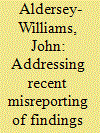

|
|
|
|
|
| Summary/Abstract |
Recent interest in the Levelised Cost of Energy (LCOE) for offshore wind has led to considerable media coverage of this topic. The paper to which this article refers provides some useful insights, but the authors are concerned that their findings are being misreported and misinterpreted. Specifically, some of the media coverage appears to misunderstand or disregard the acknowledged limitations of the paper, citing it to support contentions regarding the likely trajectory of costs for offshore wind farms. This research note addresses some of these issues and urges caution in use of the original paper’s findings. This new research note recapitulates the main themes of the original paper and directly addresses the areas where its findings have apparently been misunderstood. It concludes with a restated and reinforced warning that the analysis and projection of historic costs in offshore wind, or indeed in any fast-developing technology sector, should be undertaken with extreme caution when used to consider future cost trends.
|
|
|
|
|
|
|
|
|
|
|
|
|
|
|
|
| 2 |
ID:
175929
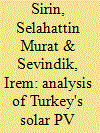

|
|
|
|
|
| Summary/Abstract |
As global investments continue in renewable energy technologies, investment costs have declined significantly. Meanwhile, many governments have shifted from pre-set renewable support schemes to auction schemes in order to introduce competition in price setting. Turkey has initiated Renewable Energy Resource Zone (RERZ) auctions to promote solar photovoltaic (PV) and wind technologies. We examine the first of these auctions, Solar PV RERZ, which has ambitious targets in terms of increasing solar PV capacity and enhancing domestic competence in solar technologies. Despite the auction being hailed as a success in terms of low prices, we utilize the Levelized Cost of Electricity generation (LCOE) analysis to demonstrate that the project is vulnerable to macroeconomic shocks and financial risks. Model results show that the capacity factor is the most prominent factor in costs, and 10% change in the capacity factor affects the LCOE about the same rate. Investment cost and interest rate are the other major factors affecting the LCOE. Based on these results, we make recommendations by discussing how Turkey can improve its auction design by incorporating some of the elements used by Brazil and South Africa.
|
|
|
|
|
|
|
|
|
|
|
|
|
|
|
|
| 3 |
ID:
166403
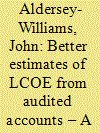

|
|
|
|
|
| Summary/Abstract |
Around the world, government policies to support new renewable energy technologies rely on accurate estimates of Levelised Cost of Energy (LCOE). This paper reveals that such estimates are based on “public domain” data which may be unreliable. A new approach and methodology has been developed which uses United Kingdom (UK) “audited” data, published in company accounts, that has been obtained from Companies House, to determine more accurate LCOE estimates. The methodology is applicable to projects configured within Special Purpose Vehicle (SPV) companies. The methodology is then applied to a number of UK offshore wind farms and one Combined Cycle Gas Turbine (CCGT) project to develop new cost data which is then compared to that presently in the public domain. The analysis reveals that recent offshore wind projects show a slightly declining LCOE and that public domain cost estimates are unreliable. But of most concern is that offshore wind farm costs are still much higher than those implied by recent bids for UK government financial support via Contracts for Difference (CfDs). The paper concludes by addressing further the question of how offshore wind projects can achieve the degree of LCOE reductions required by recent CfD bids.
|
|
|
|
|
|
|
|
|
|
|
|
|
|
|
|
| 4 |
ID:
162943
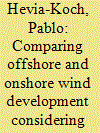

|
|
|
|
|
| Summary/Abstract |
Cost efficient deployment of wind energy is in focus for reaching ambitious targets for renewable energy and transforming the energy supply to one based on renewables. However, as more wind is being deployed the available sites onshore become less attractive in terms of wind conditions and capacity factor and more resistance from population groups affected in the deployment areas results in a reduction of areas that can be developed. We consider three different methods for estimating acceptance costs, one based on compensation and property purchase costs, one based on property value loss near wind turbines, and one based on willingness to pay calculated from a stated preference study. Utilising these methods, we provide an estimation of Levelised Cost of Energy (LCOE) for an expansion of 12 GW onshore or offshore wind capacity in Denmark. We find that the three methods provide similar estimates for local acceptance, but that a high range of uncertainty exists in the upper bound of acceptance costs. Onshore does not have a clear-cut cost advantage over offshore when considering substantial amounts of wind capacity expansion and using high estimates for nation-wide acceptance costs. Moderate onshore wind expansion considering only local acceptance has a cost advantage.
|
|
|
|
|
|
|
|
|
|
|
|
|
|
|
|
| 5 |
ID:
181433
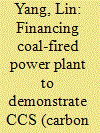

|
|
|
|
|
| Summary/Abstract |
Traditional policy incentives for carbon capture and storage (CCS) mainly rely on fiscal subsidies, which tend to put an inordinate strain on public finances. This study attempts to explore a non-fiscal incentive policy, granting a time extension (extra electricity quota), to finance early CCS demonstration projects in China. We find that coal-fired power plant (CFPP) operate at a loss even without CCS retrofitting under the current electricity quota (4000 h per year), while it can make profits with CCS retrofitting if extra electricity quotas are provided. Specifically, the electricity quota needs to be roughly 4709–7260 h per year with the CO2 capture level ranging from 0.1 to 1 Mt per year in the demonstration stage. In particular, the levelized cost of electricity (LCOE) of CFPP with a capture level of 1 Mt per year is estimated at 298.8 CNY/MWh if the electricity quota reaches 7000 h per year, which is approximately equal to that of CFPP without CCS retrofitting and extra electricity quota (292.2 CNY/MWh). Thus, the extra electricity quota can be considered as an economically feasible policy incentive, and related results are able to provide useful information for electric power enterprises and government decision-makers.
|
|
|
|
|
|
|
|
|
|
|
|
|
|
|
|
| 6 |
ID:
132748
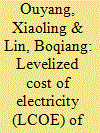

|
|
|
|
|
| Publication |
2014.
|
| Summary/Abstract |
The development and utilization of renewable energy (RE), a strategic choice for energy structural adjustment, is an important measure of carbon emissions reduction in China. High cost is a main restriction element for large-scale development of RE, and accurate cost estimation of renewable power generation is urgently necessary. This is the first systemic study on the levelized cost of electricity (LCOE) of RE in China. Results indicate that feed-in-tariff (FIT) of RE should be improved and dynamically adjusted based on the LCOE to provide a better support of the development of RE. The current FIT in China can only cover the LCOE of wind (onshore) and solar photovoltaic energy (PV) at a discount rate of 5%. Subsidies to renewables-based electricity generation, except biomass energy, still need to be increased at higher discount rates. Main conclusions are drawn as follows: (1) Government policy should focus on solving the financing problem of RE projects because fixed capital investment exerts considerable influence over the LCOE; and (2) the problem of high cost could be solved by providing subsidies in the short term and more importantly, by reforming electricity price in the mid-and long-term to make the RE competitive.
|
|
|
|
|
|
|
|
|
|
|
|
|
|
|
|
|
|
|
|
|